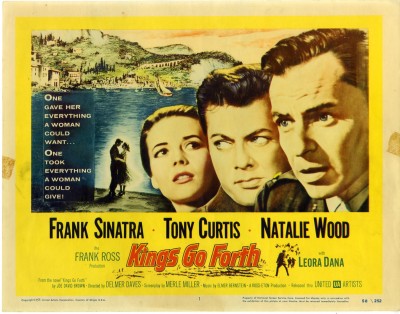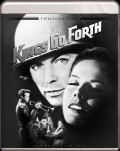| Reviews & Columns |
|
Reviews DVD TV on DVD Blu-ray 4K UHD International DVDs In Theaters Reviews by Studio Video Games Features Collector Series DVDs Easter Egg Database Interviews DVD Talk Radio Feature Articles Columns Anime Talk DVD Savant Horror DVDs The M.O.D. Squad Art House HD Talk Silent DVD
|
DVD Talk Forum |
|
|
| Resources |
|
DVD Price Search Customer Service #'s RCE Info Links |
|
Columns
|
|
|
Kings Go Forth
Twilight Time's all-region Blu-ray, licensed from MGM, offers a solid transfer of this black-and-white, 1.85:1 widescreen indie production originally released through United Artists.
During the "Champagne Campaign," the liberation of Southern France to comparatively light resistance from the Germans, First Lt. Sam Loggins (Frank Sinatra), a working class New Yorker, leads a reconnaissance unit. Their radio operator killed in action, cocky Corporal Britt Harris (Tony Curtis) is tasked with replacing him.
Harris was born into money - his father owns four lucrative textile mills - and is a slick operator, the kind of fellow who'll have you counting your fingers after shaking his hand. Handsome, talented (he plays trumpet with the skill of Al Hirt), and a brazen womanizer, Harris invites Loggins's resentment, nor does he trust him.
Loggins meets and quickly falls in love with Monique (Natalie Wood), a French-born American woman. He also becomes friendly with Monique's wealthy widowed mother, Mrs. Blair (Leora Dana, seven years younger than Sinatra, and unconvincingly wearing gray spray-painted hair and shawls in a feeble effort to make her look older than he was). He loves Monique but she wants them to remain "just friends." Further, Mrs. Blair reveals that Monique's late father was black, the reason the couple moved to France in the first place. After a week of contemplation, Loggins begins visiting the family regularly again, hoping Monique might eventually fall in love with him.
At a jazz club, the not-quite-a-couple bump into Harris, and before you can say sacrebleu Harris and Monique are a sexually active couple. Skeptical about Harris's intentions, Loggins repeatedly inquires about the relationship, and Harris keeps insisting that, forthwith, he's going to marry Monique, even after learning of her mulatto status.
Kings Go Forth is well-intentioned but the movie is pretty much a dud save for Sinatra's sincere performance, Curtis's more serious than usual one, the French locations, and Elmer Bernstein's musical score.
Supposedly Dorothy Dandridge was in the running for Wood's part, but that seems unlikely. The film's producer, Frank Ross, told The New York Times that "he was not in favor of miscegenation" (!) and that "the picture would lose its dramatic kick if the girl were [played by an actual] Negro." (!!)
Russian-American Wood was sometimes cast in ethnic roles during this phase of her career, the Russian Orthodox Wood as a Jewish girl in Marjorie Morningstar (also 1958), and as virginal, very Catholic Puerto Rican Maria in West Side Story (1961) being famous examples. She was never remotely convincing in those parts, however, with Pauline Kael famously dismissing her as "clever Natalie Wood, [the] most machine-tooled of Hollywood ingénues." Ironically, one of her best roles was in, arguably, her worst movie, Meteor (1979), speaking fluent Russian as the translator of scientist Brian Keith (also fluent). In Kings Go Forth she affects a phony French accent, is unconvincingly starry-eyed around American soldiers, goes nuts for Tony Curtis, and pretends to be half-black. It doesn't work.
Movies about racial issues were still dipping their toes in the water, and mixed-race romances, such as those found in Broken Arrow and Love Is a Many-Splendored Thing (American man, Eurasian woman, 1955) often ended tragically, though whether such writing was imposed by the Production Code (which, at least initially, specifically prohibited it) or insisted upon by nervous studio heads is not know to this writer. (Spoilers) Kings Go Forth really cops out in ways even beyond those films, especially during its hopelessly maudlin epilogue, one almost laughably playing it safe and sappy.
Miller's screenplay is also endlessly chatty: every emotion is verbalized, if not by the actors onscreen, then via Loggins's incessant narration, the kind of voice-over that instructs moviegoers how to react and explain things the audience already knows.
The picture's modest good points include Sinatra's sincere, fully-engaged performance and the interesting French locations (it looks like about two-thirds of the exteriors were shot in France*, the rest in America). Novelist Brown was himself a Second Lieutenant in the 460th Parachute Field Artillery Battalion, in Southern France, from August 1944, and one thing the picture does do unusually well is capture quiet little moments among the men. Sinatra's scenes with character actors Karl Swenson (as the Colonel) and Eddie Ryder (as Cpl. Lindsay) are more believable and interesting than anything involving that romantic triangle. A sweet scene where Swenson's Colonel offers Loggins a piece of a horribly crushed angel food cake his wife baked and shipped to him is more memorable than the film's racial angle.
Video & Audio
Filmed in black-and-white and 1.85:1 widescreen, Kings Go Forth looks good throughout with a nice, film-like texture and solid blacks. The 1.0 mono DTS-HD Master Audio is likewise fine, and offered with optional English subtitles.
Extra Features
Supplements include a trailer hosted by Sinatra himself, he suggesting King's Go Forth is another From Here to Eternity or Man with the Golden Arm. An isolated music and effects track is included, and Julie Kirgo's liner notes round out the extras.
Parting Thoughts
Sincere but not effective, Kings Go Forth is worth seeing once for its good points, but the film is pretty much a bust. Rent It.
* Little effort, however, is made to hide the very 1950s cars on the roadways there, spoiling the verisimilitude somewhat.
Stuart Galbraith IV is the Kyoto-based film historian and publisher-editor of World Cinema Paradise. His new documentary and latest audio commentary, for the British Film Institute's Blu-ray of Rashomon, and commentary track for Arrow Video's Battles without Honor and Humanity are newly available.
|
| Popular Reviews |
| Sponsored Links |
|
|
| Sponsored Links |
|
|
| Release List | Reviews | Shop | Newsletter | Forum | DVD Giveaways | Blu-Ray | Advertise |
|
Copyright 2024 DVDTalk.com All Rights Reserved. Legal Info, Privacy Policy, Terms of Use,
Manage Preferences,
Your Privacy Choices | |||||||














